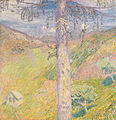For all the words devoted to teaching how to write, most of the real work comes down to this: can the writer paint a picture and immerse their reader into that picture? Whether you write fiction, memoir or essay, the reader is always looking to experience the event you’re describing. What’s the best way to accomplish this? Good scene writing.
Writing Tip for Today: Scene writing might seem too basic an idea to be a writing tip, but I love refreshing my skills by concentrating on the elements of a scene.
- Pay attention to the right details. When I tell a student to be observant, sometimes that student puts down too many details. This is overkill, bores the reader, who is looking for action and dialogue. Think of the way your eyes take in a scene: a few details stand out above the rest, details that give a character or object a quick picture the reader easily can “see.”
- When it’s complicated, opt to bend the details. Students get anxious about this one, but if you as writer are trying to describe a complex relationship (my in-law’s third cousin, only he’s only like a cousin, not really related) or object (I love the story of the mom whose toddler melted plastic magnetic alphabet letters in the oven) that gives a more immediate picture by simplifying (she changed it to a blue plastic duck). The alphabet letters could have been any letter any color, and the reader might scroll through all the possibilities, thus taking that reader out of the story.
- Just as a reminder, remember that scenes come alive with three main things: Action (includes dialog), Concrete Sensory Detail (CSD) and Emotion.
- Eleven elements of a scene: Time, Place (setting), Characters, POV character, quality of light (sunny, cloudy, dark), Purpose, sight, sound, smell, taste, touch (CSD).
Don’t miss The Bookshelf Muse’s Becca Puglisi’s Guest Post coming on Thursday, January 13th.




